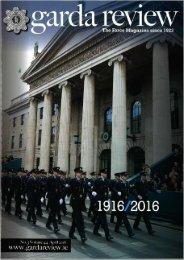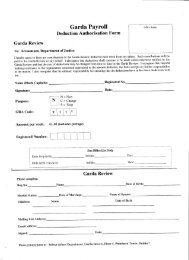Conference Report 2016
Table of contents contains links on page 5. It can be used to skip through chapters.
Table of contents contains links on page 5. It can be used to skip through chapters.
You also want an ePaper? Increase the reach of your titles
YUMPU automatically turns print PDFs into web optimized ePapers that Google loves.
Section 1: Pay and Allowances<br />
Cost Cutting and Savings Agenda<br />
2.9 The GRA engages in this Review process with a<br />
spirit of optimism. The Association’s membership<br />
has paid a heavy price for the mistakes of others,<br />
the national economy has now emerged from the<br />
clutches of the European Commission/International<br />
Monetary Fund/European Central Bank (Troika) amid<br />
ever-increasing national economic growth<br />
projections. Growth also fuels inflation, which must<br />
be factored into any national agreements on pay.<br />
2.10 The massive contribution of An Garda Síochána to<br />
the economic recovery should not go unnoticed or<br />
without acknowledgement.<br />
2.11 We now look forward to a progressive engagement<br />
with government and Garda management with a<br />
new-found confidence and vigour, putting the era of<br />
pay cuts, pension levies, declining resources and<br />
spiralling work demands behind us. The<br />
membership of the GRA has made a substantial<br />
contribution towards the improved state of the<br />
nation’s finances. Given the national economic<br />
downturn and the uncertainty of the depth and<br />
duration of the post-2007 recession this<br />
Association submitted concrete proposals serving<br />
to secure significant savings for the exchequer in<br />
response to a call for assistance from the<br />
Department of Justice.<br />
2.12 Alongside the imposed cuts, we estimated that had<br />
our proposals been implemented, they would have<br />
given rise to savings in the region of a further<br />
€80million with many components accruing on an<br />
annual ongoing basis. The Department failed to<br />
respond appropriately or to provide any substantive<br />
feedback.<br />
2.13 The GRA takes this opportunity to remind parties<br />
that it made considered submissions in the savings<br />
agenda.<br />
2.14 The new pilot Garda roster has saved some<br />
€35million, according to estimation by the<br />
independent Implementation Body. Notably,<br />
alongside the ongoing deferral of a review of this<br />
initiative, the GRA has shown restraint from formal<br />
complaints on breaches of the European Working<br />
Time Directive’s provisions (which are currently<br />
being overlooked) in the interests of making the new<br />
roster work.<br />
2.15 The provisions of the Haddington Road Agreement<br />
(HRA), under which a crucial concession was made<br />
by gardaí to work an extra three days per annum in<br />
the calendar years 2013, 2014 and 2015. As gardaí<br />
are working a 10-hour day under the new roster<br />
system, this amounts to 30 extra hours per annum<br />
(with 30 hours provided in the latter six months of<br />
2013). The official parties proceeded with this<br />
proposal on the assumption that these hours would<br />
(largely) replace overtime hours. Hence, in financial<br />
terms this should constitute a saving of 45 hours<br />
based on the current overtime premium.<br />
2.16 In manpower resource implications, the 30 extra<br />
hours across 13,000 gardaí would give rise to<br />
390,000 hours per annum saving – or the<br />
equivalent of around 200 extra gardaí. The cost<br />
saving is understood to be estimated at about €15<br />
million per annum from this measure. Notably, the<br />
proposal was recommended for acceptance by the<br />
GRA.<br />
2.17 The overtime premium payment was reduced from<br />
time and a half to time and a quarter for voluntary<br />
overtime. As much of overtime worked in An Garda<br />
Síochána is voluntary (rather than compulsory) this<br />
should constitute a crucial core cost saving.<br />
2.18 Further to the Department of Public Expenditure and<br />
Reform’s evaluation in 2012, 30 legitimate approved<br />
allowances have been denied to new recipients, a<br />
further 10 with an aggregate annual cost of over<br />
€3million were earmarked for early elimination.<br />
2.19 Under the last government’s four-year plan, sworn<br />
garda numbers were to be reduced from 14,500 at<br />
the end of 2010, to 13,500 at the end of 2011, to<br />
13,350 at the end of 2012, to 13,150 at the end of<br />
2013 and to 13,000 by the end of 2014. The<br />
estimates proved overcautious. These figures were<br />
surpassed and continue to decline.<br />
2.20 The reality is that sizeable headcount related<br />
savings – without any undue influence on<br />
productivity – have been facilitated by the<br />
membership of the GRA. The Office of the<br />
Comptroller and Auditor General has verified<br />
significant savings from the civilianisation process;<br />
but this process has the inherent threat of industrial<br />
action within the garda framework.<br />
2.21 Short-term career breaks, incentivised career<br />
breaks, unpaid leave and family-friendly schemes in<br />
An Garda Síochána are being made available to a<br />
greater extent than before. It is understood that<br />
about €0.5 m. in savings is linked to this initiative<br />
though the pension implications are unsatisfactory<br />
to the Association’s membership.<br />
2.22 These savings have now completed a task deemed<br />
necessary at that time; and that time has now<br />
38th Annual Delegate <strong>Conference</strong><br />
21




